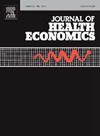非正式照顾对照顾者劳动力市场结果的影响:来自HILDA的证据
IF 3.6
2区 经济学
Q1 ECONOMICS
引用次数: 0
摘要
本研究利用澳大利亚家庭、收入和劳动力动态(HILDA)调查的数据,考察了非正式护理对劳动力市场结果和福祉的因果影响。我们将事件研究设计与工具变量(IV)策略结合起来,利用从严重疾病或伤害到家庭成员的外源性变异。事件研究结果表明,健康冲击大大增加了非正式护理,对妇女和老年人的影响尤其大。这些冲击还导致这些群体的就业减少,工作时间缩短,心理健康状况恶化,越来越依赖政府支持和提前退休。为了分离护理的因果效应,我们将护理与健康冲击的时间联系起来。IV估计表明,承担照顾责任导致劳动力供应大幅减少,主要照顾者每周工作时间减少9.7小时,伴侣照顾者每周工作时间最多减少22.5小时。我们的研究结果强调了非正式护理的巨大经济成本,这对老龄化社会的劳动力参与具有重要意义。本文章由计算机程序翻译,如有差异,请以英文原文为准。
Effects of informal caring on labour market outcomes of carers: Evidence from HILDA
This study examines the causal impact of informal caregiving on labour market outcomes and well-being using data from the Household, Income and Labour Dynamics in Australia (HILDA) survey. We combine an event study design with an instrumental variable (IV) strategy, leveraging exogenous variation from serious illness or injury to a family member. Event study results show that health shocks significantly increase informal caregiving, with particularly large effects for women and older individuals. These shocks also lead to reductions in employment among these groups, as well as declines in hours worked, worsening mental health, and increased reliance on government support and early retirement. To isolate the causal effect of caregiving, we instrument caregiving with the timing of the health shock. IV estimates indicate that assuming caregiving responsibilities leads to large reductions in labour supply—weekly work hours fall by 9.7 h for main carers and up to 22.5 h for carers of partners. Our findings highlight the substantial economic costs of informal caregiving, with important implications for labour force participation in an ageing society.
求助全文
通过发布文献求助,成功后即可免费获取论文全文。
去求助
来源期刊

Journal of Health Economics
医学-卫生保健
CiteScore
6.10
自引率
2.90%
发文量
96
审稿时长
49 days
期刊介绍:
This journal seeks articles related to the economics of health and medical care. Its scope will include the following topics:
Production and supply of health services;
Demand and utilization of health services;
Financing of health services;
Determinants of health, including investments in health and risky health behaviors;
Economic consequences of ill-health;
Behavioral models of demanders, suppliers and other health care agencies;
Evaluation of policy interventions that yield economic insights;
Efficiency and distributional aspects of health policy;
and such other topics as the Editors may deem appropriate.
 求助内容:
求助内容: 应助结果提醒方式:
应助结果提醒方式:


